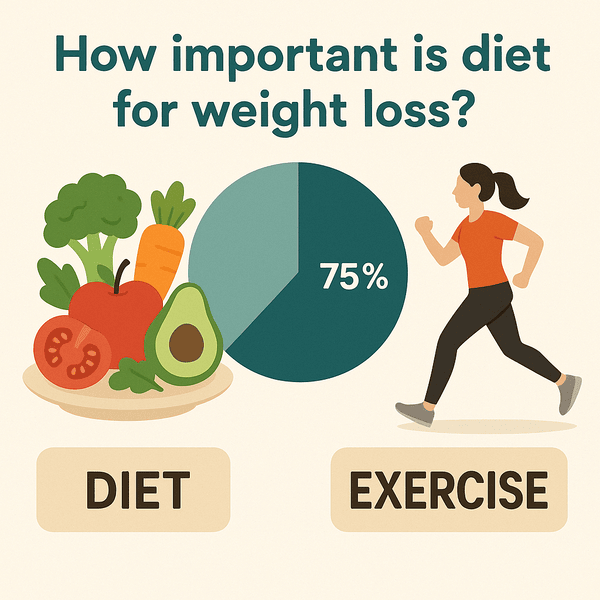Weight loss is a popular topic in health and fitness discussions. How important is diet for weight loss? Every year, millions of people try to lose pounds, increase their health, and feel better about themselves. Despite many books, programs, and available products, many struggle to keep the weight away for good. An important question at the heart of this challenge is how much diet is really needed to lose weight.
If you have ever thought that you are focusing more on what you eat or how much you exercise, you are not alone. The debate between diet and exercise continues, but the results and real results agree on a point: Diet plays the biggest role in weight loss. How important is diet for weight loss? This guide will tell you why what you eat is so much, how it works with other factors, and how to use diet to reach your weight goals.
Understand the basics of weight loss
Before focusing on your diet, it is important to understand the science behind losing weight. This process depends mainly on balanced energy – you take the levels you burn.
Calorie in and Calorie out
References to the energy from food and drink you use. Calorie is the energy out of the energy that your body uses to digest basic needs (to maintain metabolic rate), daily activities, and food. If you eat more calories than you burn, you will gain weight. How important is diet for weight loss? If you eat less, you will lose weight. This idea, called calorie deficit, is the key to weight loss.
Why is it difficult in real life?
Although mathematics is simple, many factors make it difficult. Your metabolism, hormones, genetics, environment, and habits all play a role. But the most direct way to control your calorie intake is through diet. This is the simplest factor you can change to affect weight loss.
Why is it more important than training to lose weight
Many people believe that exercise is the most important way to throw the pound. Although being active is good for health, the effect on weight loss is often exaggerated. Why is it more focused on diet here?
- It is easier to reduce the intake of calories than to burn them. A single slice of pizza can have 300-400 calories. To burn calories, you need to jog for 30 to 40 minutes, depending on your weight and how hard you work. Leaving an extra slice is much easier than running for three-quarters of an hour.
- Exercise can make you hungry. Hard workouts can increase appetite, so you can only eliminate and undo the burned calories. Some people also say how many calories they burn during exercise, which makes them eat more. How important is diet for weight loss?
- You do what you eat directly. While exercise can help create a calorie deficit, the control of food intake is more effective for weight loss.
- The study shows that the diet plays a big role. Research suggests that dietary changes lead to a greater weight lower than exercise alone. For example, a review in 2014 found in the journal Obesity Review that those who only focus on the diet lose weight more than those who just train.
- Exercise is important for health, not just to lose weight. It helps your heart, creates strength, and supports mental health. But when it comes to losing the pound, the diet is the most important driver.
The meaning of macronutrients: protein, carbohydrates, and fat
Not all calories have the same effect. The balance between protein, carbohydrates, and fat in your diet affects weight loss in many ways. How important is diet for weight loss?
Protein: Key to weight loss
- This helps you feel longer, making it easier to cut calories.
- During weight loss, protein protects your muscles.
- It also increases calorie burning because your body uses more energy to digest it than carbohydrates or fat.
Carbohydrate: Assistant or harmful?
Recently, carbohydrates have been wrong for weight gain. They are not always enemies. Types and zodiac signs are most important. How important is diet for weight loss?
- Whole grains, fruits, and vegetables provide fiber and essential nutrients.
- On the other hand, sugar snacks and sophisticated grains can increase blood sugar and increase appetite.
Fat: Not Required, Not Injurious
Healthy fat hormones from sources such as nuts, seeds, avocado, and olive oil are important for health and brain function. They also help you feel full. The key is to choose unsaturated fat over trans fat and saturated fat, and eat them in any way. How important is diet for weight loss?
Quality versus volume: Moduses Food Type?
It is important to keep up with calories, and what type of food you eat also makes a big difference. Why does something mean here:
Nutritious density
Foods that are packed with vegetables, fruits, lean meat, and whole grains, such as vitamins, minerals, and fiber, support good health. They make it easy to live within their calorie measures without feeling hungry. How important is diet for weight loss?
Processed food and more food
Many processed foods are designed for very good taste, which can make it difficult to stop eating. They are often some fiber and some nutrients, making you dissatisfied and more likely to have breakfast soon. How important is diet for weight loss?
Blood sugar and insulin
Eating a lot of sophisticated carbohydrates and sugary foods increases blood sugar levels and fall rapidly. It can trigger more hunger and strong cravings. How important is diet for weight loss?
Swelling
Some foods, especially added sugar and unhealthy fat, can cause inflammation in the body. It is associated with weight gain and health problems over time.
Food Psychology: Habits, Triggers, and Mindfulness
Weight management involves more than choosing the right food – it also depends on understanding why you eat. Emotions such as stress or boredom, with habits, affect the behavior of eating. How important is diet for weight loss?
- Emotional food often causes people to relax or reward themselves with food. Discovering these emotional patterns is the first step towards change.
- Your environment also shapes your eating habits. Keeping unhealthy snacks out of visually, eating on a table, and avoiding distractions during meals can help you eat more heart.
- Mindful eating means focusing and feeling complete. Eventually, eating and the taste of each bite can promote better digestion.
- Getting permanent weight loss is about creating a healthy routine. This is not just willpower. Planning the food, preparing healthy snacks, and setting small, achievable goals are important steps.
Effects of food options on metabolism and hormones
What you eat has more effect than calories – your diet also affects how your body burns fuel and controls the hormones that control weight.
Adjustment in metabolism
Losing weight usually slows metabolism. Your body reduces energy consumption to save resources, a reaction called metabolic adaptation or “starvation mode”. Eating the right foods can help prevent this recession by maintaining muscle and ensuring proper nutrition. How important is diet for weight loss?
Hormonal balance and food
Hormones such as insulin, leptin, and ghrelin affect appetite, perception, and fat storage. Eating many processed foods or sugar can disturb these hormones, making it difficult to lose weight. How important is diet for weight loss?
- Insulin: Consuming a lot of carbohydrates and sugar can make your body resistant to insulin. This makes it difficult to burn fat effectively.
- Leptin: This hormone signals when you are full. A diet rich in processed foods can interfere with the signs of leptin, leading to more food.
- Ghrelin: Often called “Appetite Hormones”, the level of ghrelin increases before meals and sinks after meals. If your diet makes you feel unhappy, Grelin increases, increasing appetite. How important is diet for weight loss?
The effect of food time and how often you eat
There is confusion around when and how many times you eat affects weight loss. Popular methods include stopping fasting, eating small foods more often, or sticking to three regular foods daily.
Intermittent fasting
An inner fasting (if) involves switching between food and a fixed duration. Some research suggests that by cutting calorie intake and your body can improve its reaction to insulin. If the real reason it helps it’s that it eats you a lower calories. How important is diet for weight loss?
Small, more frequent food
The myth that often increases metabolism by eating small foods is common, but wrong. What does it mean by how many calories you use, not how many times you eat?
Focus on your body
The best method is one that fits your lifestyle and helps you control your calories. Some people find the time for structured food easier, while others prefer more flexible approaches. How important is diet for weight loss?

The role of the food environment in your diet
Your environment affects what and how you eat affects your success with losing weight. How important is diet for weight loss?
At home, keep healthy foods available easily:
- Learn your kitchen with fruits, vegetables, lean meat, and whole grains.
- Avoid bringing junk food with you. If it is not there, eating is less attractive.
- Prepare food in advance – when you are busy or tired, it helps you avoid unhealthy options.
Your social environment also means something.
- Tell friends and family about weight loss goals so they can support your efforts.
- Plan social events by bringing healthy snacks or eating a small, nutritious food in advance.
While eating, check the menu before leaving.
- Many restaurants show nutrition information online.
- Be deliberate in sub-size: Restaurant portions are often much larger than necessary.
- Choose healthy options: Go for the grilled instead of fried foods, ask to dress on the side, and avoid sugary drinks.
Mentality and inspiration play a major role in weight loss. Your mental attitude can determine your success or failure. How important is diet for weight loss?
Set goals that are realistic
Expecting too fast can cause disappointment, and you will leave. The objective is to lose about 0.5 to 1 kg (1-2 pounds) each week. In this way, your progress is stable and manageable. How important is diet for weight loss?
Track your progress regularly
Keep comments about what you eat, your weight, and your body measurements. Celebrate little victories on the way, such as feeling more energetic or having better sleep. These achievements mean the same.
Everyone is facing the wrong many times
The important thing is to return to the track without feeling guilty. No measure of perfection – continuous effort sometimes means more than a slip. Continue to move on, one step at once. How important is diet for weight loss?
Effective ways to support a weight loss diet
So, how can you do the best work on your diet to lose weight? Here are some simple, proven suggestions:
- Follow your food to use a food journal or app to log what you eat. Being aware of your intake helps identify where changes are needed.
- Focus on natural foods, eat more vegetables, fruits, lean meat, whole grains, and healthy fats. These foods are rich in nutrients and complete you for a long time.
- See your Share Healthy Foods can still cause weight gain if you eat them in large quantities. Use small plates, measure portions, and pay attention to signs of appetite.
- Cut down sugar and processed foods, reduce sugary drinks, sweets, and processed snacks. They add many calories, but some nutrients.
- Prepare the food ahead of time and make cooking food easier to avoid unhealthy options and stick to your goals.
- Drink a lot of water, sometimes hunger is really thirst. Being well hydrated helps to dampen unnecessary food.
- All flexibility is allowed to maintain a strict diet. You can help yourself behave now and then avoid being inspired and deprived of.
- Get support to be friends, family, or a professional, so you can encourage yourself to make a big change in being responsible. How important is diet for weight loss?
Part of exercise: supports your diet
Eating well is the bulk of losing weight, and training is also important:
- It helps to keep the muscles. Training in particular preserves muscles during weight loss.
- It accelerates metabolism. More muscles mean that you burn more calories even more comfortably.
- It benefits your health. Regular activity reduces the risk of many diseases, increases mood, and increases energy.
- This helps you keep weight loss over time. Being active is important for long-term success.
But remember that exercise alone will not cure a bad diet. Use it in support, do not replace, healthy eating habits. How important is diet for weight loss?
Stories of success in real life: the effect of diet
Many individuals have improved their health and have changed their lives through better eating habits. Here are some remarkable examples:
Case Study 1: Sara Change
Sara tried countless training routines and struggled with weight problems for years. His success was when he began to track his food intake and choose whole, unprocessed foods. Within a year, he lost 50 kilos and developed a strong understanding of healthy eating habits. How important is diet for weight loss?
Case Study 2: Mike’s progress
Mike thought he could eat what he wanted until he went to the gym regularly. Still, the scale remained the same. Working with a nutritionist helped him create a smart meal alternative. Eventually, he began to lose weight and felt more energetic than ever.
Case study 3: Mediterranean diet
Studies show that after the Mediterranean diet has communities – vegetables, fruits, whole grains, and healthy fats – low frequencies of obesity and chronic diseases. It sheds light on the benefits of eating a balanced, nutritious diet for long-term health. How important is diet for weight loss?
Cast diet and risk of quick reforms
Many people will have quick results, fog diets, detox plans, or serious calorie restrictions against the cut. Rapid weight loss can occur before these methods, but it can rarely last and be harmful.
Why the mania diet is not working in the end
Extreme diets often release important nutrients, leading to fatigue and health problems. They can also cause muscle loss, not just fat loss. Severe caloric cutting can slow your metabolism, making it difficult to maintain weight loss. Many people feel that you can slim, gain weight, and sometimes more until they stop the diet. How important is diet for weight loss?
Why changes over a long time
The best diet is what you can follow for life. Instead of chasing fast reforms, focus on making small, stable changes you can keep. Permanent habits produce better results and improve your overall health.
Genetics and Individual Differences
- Genetics and personal differences influence weight loss, but they are not the only factors. While diet remains the most important, some people have a genetic tendency to gain weight more quickly. Others may have a slower metabolism. Still, genetics do not determine your future entirely. Your choices in diet and activity still matter a lot.
- What fits one person might not suit another. Some do better with low-carb plans, while others find success on higher-carb, plant-based diets. The goal is to find a routine that you can stick with long-term and that works for your body. How important is diet for weight loss?
The Importance of Sleep and Stress Management
- Sleep and stress levels also affect your weight loss results. Getting enough sleep is crucial. When you don’t sleep enough, hunger hormones get out of balance, cravings rise, and sticking to your diet becomes harder. Aim for 7 to 9 hours of good sleep each night.
- Stress can lead to emotional eating and fat buildup, especially around the stomach. Managing stress through meditation, deep breathing, or yoga can help control these effects and support your weight loss efforts. How important is diet for weight loss?
The role of stability and patience in weight loss
It takes time to lose weight. This is a process, not a race. Those who find success are usually those who stick to stable, permanent habits. How important is diet for weight loss?
Small steps lead to great results
You don’t have to change everything overnight. Start with small adjustments, such as adding a few more veggies or reducing sugary drinks. How important is diet for weight loss?
Be aware of progress, not perfection
Don’t let small mistakes stop your progress. Go aim to create healthy alternatives most of the time. Sometimes you can enjoy behavior without guilt. How important is diet for weight loss?
Conclusion: How important is the diet for weight loss?
The diet plays the biggest role when it comes to losing weight. Even if you reduce the case of exercise, sleep, and stress, what you eat affects your success the most. Your ability to throw pounds and keep them closed depends largely on your diet. How important is diet for weight loss?
However, it is not a single right plan for everyone. The best diet is what you can follow continuously. It should match your lifestyle, preferences, and needs. Be aware of eating complete, nutritious food, see your part, and develop healthy habits. With patience and steady efforts, it is quite possible to reach your weight goals and improve your health. How important is diet for weight loss?
Starting the weight loss is within reach. Remember that minor changes are easy to maintain with timely connection. Be aware of your eating habits, stick with your plan, and celebrate each victory on the way.
If this guide was useful, you can share it with a friend or leave a comment below with your own tips and stories. How important is diet for weight loss?
FAQ
Is diet more important than exercise for losing weight?
Yes, diet is more influential than exercise when trying to lose pounds. While both are good for health, creating a calorie deficiency through food choices generally works better than exercise alone.
Can I lose weight by changing my diet only, without exercising?
Yes, losing weight substantially depends on eating fewer calories than you burn. You don’t need exercise to see results, but adding it can help maintain muscle and boost your health.
What’s the stylish diet for weight loss?
There’s no single perfect diet. The stylish one creates a calorie deficiency, is balanced, includes whole foods, and is easy to stick with long-term.
Do I’ve to count calories to lose weight?
Counting calories can help some understand their intake, but it isn’t necessary. Watching portion sizes and choosing whole foods also work well. Harkening to your hunger signals helps, too.
Are low-carb diets better for losing weight?
Low-carb diets can work for some people, but aren’t necessary for everyone. The main factor is eating fewer calories, no matter which macronutrient you cut back on.
How presto can I anticipate losing weight with diet changes?
Losing about half to one kilogram( 1- 2 pounds) a week is safe and sustainable. Losing weight too quickly can lead to muscle loss and make it hard to keep up.
Can I eat my favorite foods and still lose weight?
Yes, in temperance. The secret is balance and controlling portion sizes. Avoiding certain foods altogether can beget jones and lead to gluttony.
Why does my weight loss decelerate after some initial progress?
Weight loss frequently stalls because your body needs fewer calories as you get lighter. Changing your calorie intake or adding exertion can help break through the plateau.
Does meal timing impact weight loss?
Timing your refections, like with intermittent fasting, helps some manage calories more. But overall, your total calorie input over time matters most.
How crucial is hydration for weight loss?
Drinking enough water supports overall health and can reduce hunger. Occasionally, thirst feels like hunger, leading to redundant snacking. Staying doused helps control that.











